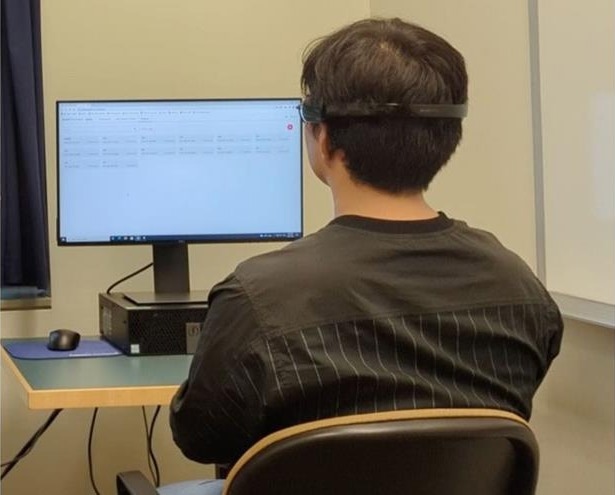Under the guidance of John Kounios, Ph.D., a professor at Drexel University’s College of Arts and Sciences and director of the Creativity Research Lab, researchers have developed an artificial intelligence (AI) technique to accurately estimate an individual's brain age using electroencephalogram (EEG) scans.

Drexel University postdoctoral researcher Yongtaek Oh wearing EEG device in Drexel University’s Creativity Research Laboratory. Image Credit: Drexel University
This innovation, detailed in a study published in the journal Frontiers in Neuroergonomics, could significantly enhance early and routine screening for degenerative brain diseases, making it more accessible.
As individuals age, so do their brains. However, rapid brain aging increases the risk of age-related disorders such as moderate cognitive impairment, dementia, and Parkinson's disease. If “brain age” could be easily quantified, it would be possible to treat premature brain aging before it causes major health concerns.
In this study, the researchers were able to estimate a person’s brain age using machine learning, which works similarly to how one can determine an individual’s age from their physical appearance.
When you meet someone for the first time, you might try to estimate his or her age: Is their hair grey? Do they have wrinkles? When you learn how old they really are, you might be surprised at how young or old they look for their age and judge that they are aging more quickly or more slowly than expected.
John Kounios, Ph.D., Professor, College of Arts and Sciences, Drexel University
Machine-learning algorithms have the capability to analyze MRI images from healthy individuals to identify features that predict brain age. By inputting numerous MRI scans of healthy brains into a machine-learning algorithm, along with the chronological ages associated with each brain, the algorithm learns to accurately estimate an individual's brain age based on their MRI scan.
Building on this framework, Professor John Kounios and his colleagues at Drexel University have adapted this method to use electroencephalograms (EEGs) instead of MRIs, expanding the technology’s application and accessibility.
According to Professor John Kounios, this method serves as a gauge of general brain health. A brain that appears younger than those of other healthy individuals of the same age generally indicates good health. Conversely, a brain that appears older suggests a 'brain-age gap,' which may indicate premature aging.
Kounios notes that such discrepancies can stem from factors like past diseases, exposure to toxins, poor nutrition, or injuries. This brain-age gap could make an individual more susceptible to age-related neurological disorders.
Despite the significance of brain age estimates as a crucial health marker, they have yet to be widely integrated into healthcare practices.
Kounious added, “Brain MRIs are expensive and, until now, brain-age estimation has been done only in neuroscience research laboratories. But my colleagues and I have developed a machine-learning technology to estimate a person’s brain age using a low-cost EEG system.”
Electroencephalography, or EEG, is a recording of a person’s brain waves. It is a less expensive and less invasive procedure than an MRI — the patient simply wears a headset for a few minutes. Thus, according to Professor Kounios, a machine learning program capable of estimating brain age using EEG scans instead of MRIs could serve as a more accessible screening tool for assessing brain health.
“It can be used as a relatively inexpensive way to screen large numbers of people for vulnerability to age-related. And because of its low cost, a person can be screened at regular intervals to check for changes over time. This can help to test the effectiveness of medications and other interventions. And healthy people could use this technique to test the effects of lifestyle changes as part of an overall strategy for optimizing brain performance,” Kounious concluded.
Drexel University has licensed its brain-age estimation technology to DiagnaMed Holdings, a Canadian healthcare business, for use in a new digital health platform.
Alongside Professor Kounios, the study also benefited from the contributions of Fengqing Zhang, Ph.D., and Yongtaek Oh, Ph.D., from Drexel University, as well as Jessica Fleck, Ph.D., from Stockton University.
Journal Reference:
Kounios, J., et. al. (2024) Brain-age estimation with a low-cost EEG-headset: effectiveness and implications for large-scale screening and brain optimization. Frontiers in Neuroergonomics. doi:10.3389/fnrgo.2024.1340732